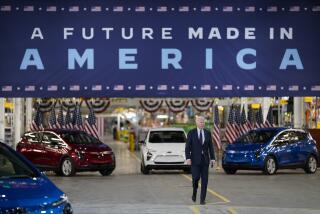U.S. Official Urges Easing Auto Fuel Economy Rules : Free-Market Forces Would Be More Effective in Improving Efficiency, Senate Panel Told
- Share via
WASHINGTON — A top Energy Department official said Tuesday that the federal government should consider relaxing fuel economy standards for passenger cars, maintaining that free-market forces would be more effective in improving automobile fuel efficiency.
“The Reagan Administration believes that citizens are capable of making their own decisions, based on their own criteria of economics and individual well-being,” William J. Silvey, deputy assistant energy secretary for policy, planning and analysis, told a Senate subcommittee.
“We believe that only market forces--not government controls--will bring about significant, further economical improvements in automobile efficiency,” Silvey said.
In addition, Sen. Don Nickles (R-Okla.), chairman of the subcommittee, declared that the federal standard needs “some serious review.”
Imposed After Embargo
The fuel economy standard for domestic and foreign passenger cars was imposed by Congress in 1975, two years after the first Arab oil embargo led to serious gasoline shortages in the United States. The standard--an average that must be met by a company’s entire fleet--originally was 18 miles per gallon for 1978 models and has been increased gradually to the current 27.5 m.p.g.
General Motors Corp. and the Ford Motor Co. have asked the National Highway Traffic Safety Administration to roll back the standard to 26 m.p.g. beginning next year. But the Washington-based Center for Auto Safety, a public interest group, has called for a standard of 31.5 m.p.g. in 1987 and 40.5 m.p.g. by 1990.
Diane K. Steed, head of the highway agency, told a hearing of the Senate Energy and Natural Resources energy regulation and conservation subcommittee that officials hope to make a decision by June.
Although noting that Americans’ shift to larger cars in recent years could reduce earlier achievements in fuel efficiency, Steed reiterated the Administration’s position that free-market factors “are the most efficient means of achieving appropriate levels of fuel economy over the long run.”
Can’t Meet Standards
She said companies that say they cannot meet the 27.5-m.p.g. standard include GM, Ford, BMW, Jaguar, Mercedes-Benz, Peugeot, Saab and Volvo. Only Chrysler and many Japanese manufacturers say that they can comply.
Called an ‘Absurdity’
However, several senators were skeptical of the Administration’s reliance on the free market, and Sen. Howard M. Metzenbaum (D-Ohio) called it an “absurdity” to consider lowering the standard.
Similarly, Sen. Daniel J. Evans (R-Wash.) said: “We cannot afford, out of complacency or myopia, to abandon the modest yet successful efforts that we initiated in energy conservation over 10 years ago.”
Meanwhile, California Rep. Barbara Boxer (D-Greenbrae) called for a standard of 45 m.p.g. by 1995 and testified that she has more than 20 co-sponsors for such legislation.
Without a lower standard, GM and Ford will be faced with multimillion-dollar fines. The companies currently are allowed to accumulate “credit” for models that meet the standards and apply them to cars that do not comply. The credits are also used to reduce penalties for failing to meet the standards.
Chief GM economist Marina Whitman argued that a lower standard is necessary because of tough competition and the lessening of tensions in the world energy situation. Plentiful supplies of gasoline and declining fuel prices have caused a strong resurgence in demand for family-size cars and better-performing cars with larger engines, she said.
“Unless the standard is lowered, full-line manufacturers, to achieve compliance, face the prospect of restricting product availability--which translates into plant closings, job losses and lower economic growth,” she said.
In contrast, Robert S. Miller Jr., an executive vice president at Chrysler, said that his company strongly opposes any rollback because Chrysler--which produces fewer larger cars--would be left with “an immediate competitive disadvantage in the marketplace.”






